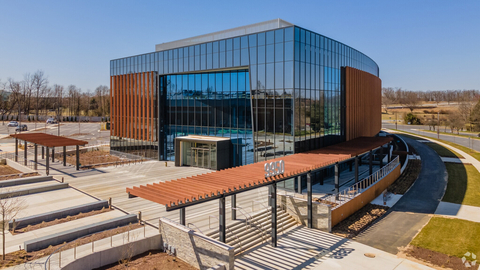AstraZeneca expands US manufacturing footprint to accelerate ambitions in next-generation cell therapy discovery and development
New facility in

New AstraZeneca facility in
The site represents the latest investment in cell therapy for AstraZeneca following collaborations with Quell therapeutics, AbelZeta, Cellectis, and the acquisition of Neogene Therapeutics.
Pam Cheng, Executive Vice President of Global Operations & IT and Chief Sustainability Officer, AstraZeneca, said: “We are incredibly excited that more than 150 new highly skilled jobs are being created to bring our scientific work and therapies to clinical trials which could transform the lives of patients around the world. This new
The facility in
The
Notes
AstraZeneca in oncology cell therapy
AstraZeneca is building a cell therapy portfolio that aims to empower and equip the immune system’s T-cells to more effectively fight cancer. The company's research teams are exploring new ways to target and arm CAR-Ts to increase their effectiveness in solid tumors by overcoming the immune-suppressive tumor microenvironment. Looking to the future, AstraZeneca is working to engineer next-generation cell therapies, where physicians could potentially select from a library of off-the-shelf patient-ready therapies already developed from the cells of healthy donors.
AstraZeneca is advancing multiple armoured autologous CAR-T, including Glypican 3 (GPC3) targeting CAR-Ts in hepatocellular carcinoma. AZD5851, currently in Phase I, is being developed globally, and AZD7003 / C-CAR031 is being co-developed with AbelZeta in
Also, in early development is AZD6422, a novel Claudin 18.2 targeting CAR-T currently being evaluated in solid tumors in an IIT in
Beyond this, the company is advancing a pipeline of novel T-cell receptor therapies (TCR-Ts) through Neogene Therapeutics, a wholly owned subsidiary of AstraZeneca. This includes NT-125, a fully individualized TCR-T, NT-175, a TP53 mutant targeting TCR-T and NT-112, a KRAS mutant targeting TCR-T, all in Phase I clinical trials in solid tumors.
About AstraZeneca
AstraZeneca is a global, science-led biopharmaceutical company that focuses on the discovery, development and commercialization of prescription medicines in Oncology, Rare Diseases and BioPharmaceuticals, including Cardiovascular, Renal & Metabolism, and Respiratory & Immunology. Based in
View source version on businesswire.com: https://www.businesswire.com/news/home/20240206590080/en/
Media Inquiries
Brendan McEvoy, +1 302 885 2677
US Media Mailbox: usmediateam@astrazeneca.com
Source: AstraZeneca







